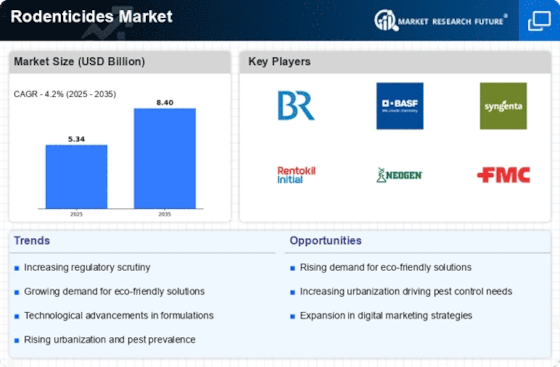Top Industry Leaders in the Rodenticides Market
 Rodenticides Market Outlook
Rodenticides Market Outlook
The Rodenticides market, a crucial segment within the broader pest control industry, is witnessing a dynamic and competitive landscape as global concerns regarding rodent-borne diseases and crop protection intensify. Key players in this market have strategically positioned themselves to address these challenges and tap into the growing demand for effective rodent control solutions.
Key Players :
- Bayer AG (Germany)
- Syngenta AG (Switzerland)
- BASF SE (Germany)
- Rentokil Initial Plc (UK)
- Ecolab Inc. (US)
- Rollins Inc. (US)
- UPL Limited (India)
- Anticimex (Sweden)
- The Terminix International Company (US)
- Liphatech Inc. (US)
- Neogen Corporation (US)
- PelGar International (UK)
- Bell Laboratories Inc. (US)
- JT Eaton (US)
Truly Nolen (US)
Strategies Adopted: Beyond the Bait Bowl
Beyond simply offering effective rodent control solutions, market leaders employ diverse strategies to solidify their positions. for instance, leverages its research prowess to develop innovative bait formulations and delivery systems, while Bayer focuses on expanding its reach into emerging markets and offering integrated pest management solutions. Meanwhile, Syngenta prioritizes sustainability initiatives and eco-friendly alternatives, catering to the growing demand for green pest control methods.
Factors for Market Share Analysis: More than Meets the Eye
While established players dominate, several factors influence market share beyond brand recognition. Regional variations in demand play a crucial role. Asia-Pacific, with its burgeoning urbanization and high rodent populations, is a major driver of growth. Regulation and environmental concerns also impact market dynamics. For example, stringent regulations in Europe regarding rodenticide ingredients have spurred the development of safer alternatives.
New and Emerging Companies: Nibbling at the Edges
Innovation breeds competition, and new entrants are constantly stirring the pot. Companies like Bell Laboratories, Inc. and Spectrum Brands Holdings, Inc. are carving niches in specific segments like professional pest control services and consumer-friendly traps. Meanwhile, startups like SenesTech and Terminix International are pushing the boundaries with next-generation technologies like ultrasonic repellents and AI-powered rodent monitoring systems.
Industry News: Buzzing with Developments
The rodenticides market is abuzz with exciting developments. The recent acquisition of Bell Laboratories by BASF signals a consolidation trend, while Syngenta's partnership with the University of Queensland to develop genetically modified mice resistant to traditional rodenticides raises ethical questions and paves the way for novel control methods. Additionally, the growing popularity of eco-friendly solutions like rodent-attracting plants and natural repellents presents lucrative opportunities for green pest control companies.
Investment Trends: Where the Money Flows
Investment trends reflect the market's evolving priorities. Increased focus on public health and hygiene is driving investments in professional pest control services and innovative technologies like smart traps and digital monitoring systems. Additionally, the rise of pet ownership and concerns about rodent-borne diseases are fueling the demand for safe and effective consumer-grade rodenticides.
Overall Competitive Scenario: A Maze of Challenges and Opportunities
The rodenticides market's competitive landscape is a maze of established players, disruptive newcomers, and ever-evolving trends. The ability to adapt to changing consumer preferences, regulatory environments, and technological advancements will be key to success. With sustainability becoming a cornerstone of pest control, companies investing in eco-friendly solutions and leveraging data-driven technologies are poised to gain a significant edge.
Conclusion:
The global rodenticides market is a dynamic arena, teeming with competition and rife with potential. Understanding the strategies, players, and trends shaping this landscape is crucial for anyone navigating its opportunities and challenges. As the quest for effective and sustainable rodent control intensifies, one thing is certain: the race for market dominance promises to be an exciting one to watch.
Recent News
Monheim, Germany - January 22, 2024 - In a landmark move for the rodenticides market, Bayer AG, the global pharmaceutical and agricultural giant, has unveiled "EcoShield," a revolutionary new rodenticide made entirely from naturally occurring ingredients. This move positions Bayer as a frontrunner in the burgeoning green pest control market, potentially disrupting the industry's reliance on traditional chemical-based solutions.
EcoShield features a unique active ingredient derived from a specific strain of tropical bacteria. This novel compound disrupts rodents' digestive systems, leading to dehydration and death. However, unlike traditional anticoagulants, EcoShield poses minimal risk to non-target species like pets and wildlife, making it a much safer and more eco-friendly option.
"We recognize the growing demand for sustainable pest control solutions," stated Dr. Anna Schmidt, Head of Research and Development at Bayer's Environmental Science Division. "EcoShield represents a significant advancement in our commitment to responsible pest management, offering effective rodent control without compromising environmental safety."
This news has sent ripples through the market, with industry experts predicting a significant shift towards bio-based rodenticides. EcoShield's eco-friendly profile and perceived safety advantages are expected to appeal to both professional pest control companies and environmentally conscious consumers.
The launch of EcoShield comes at a pivotal time for the rodenticides market. Growing public awareness of the environmental and health risks associated with traditional rodenticides has fueled demand for greener alternatives. Additionally, stricter regulations in Europe and North America are pushing manufacturers to develop safer and more sustainable solutions.
While some traditional players might view EcoShield as a potential threat, it also presents an opportunity for collaboration and innovation. Partnerships between established companies and bio-tech startups specializing in eco-friendly pest control methods could accelerate the development of a diverse range of sustainable solutions.










